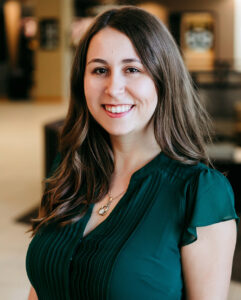For as long as she can remember, autism has always played a role in Jennifer Weyman’s life.
“Growing up in Miami, my very best friend from a young age had a brother diagnosed with autism,” Weyman said. “I spent so much time with my friend and her family, so I learned a lot about autism and how it affects the entire family.”
Weyman earned a bachelor’s degree in psychology from the University of

Florida. During that time, she also volunteered at a school dedicated to
children with special needs, including autism. Through earning her degree and working at the school, Weyman was exposed to Applied Behavior Analysis (ABA), and its potential for helping children with autism, for the first time.
“I was able to witness firsthand the great power that ABA can have in
helping transform the lives of children and their families,” Weyman said. “ABA can work for a number of different populations, but to see how effective it could be for children with autism and severe behavioral issues, it really called to me.”
This calling led Weyman to pursue a master’s degree in human service psychology (ABA track) at the University of Maryland, Baltimore County. She then worked with children with severe behavioral problems at an inpatient facility at Kennedy Krieger Institute.
“Working with these children with the most severe behavioral problems, so severe that they needed to be kept in an inpatient facility during their treatment, it once again reinforced how well ABA can work for these children,” Weyman said. “To see children transform from being at risk for self-harm and harming others in just a few months was amazing.”
Weyman then moved back home to Florida where she earned a doctoral degree at the University of South Florida before receiving the call to come to the Thompson Center and Mizzou. At MU, Dr. Weyman holds a faculty position as an assistant teaching professor of special education in the MU College of Education.
“Jen has a strong background in severe problem behavior reduction including working at Kennedy Krieger Institute,” said Dr. Casey Clay, director of the Thompson Center Applied Behavior Intervention Services. “She also has incredible research experience and interest in repetitive and restrictive behavior which frequently occurs in children with ASD.”
“I was drawn to the Thompson Center and the University of Missouri because of the amazing opportunity to work with student trainees in a real-life clinical setting,” Weyman said. “The Thompson Center is unique because so many ABA training programs do not have opportunities for the professors to work side-by-side with their trainees, to truly guide their training while working with real patients.”
Dr. Weyman is also enthusiastic about the amazing opportunities the Thompson Center provides for advancing research in best practices for training ABA students on working with children with severe behavior problems.
“I’m excited to explore and evaluate different treatments for problem behavior including restricted and repetitive behavior,” Weyman said. “I’m also excited to have the opportunity to mentor the next generation of ABA providers.”
And the next generation of ABA providers, and their future patients, should be equally excited as well.

